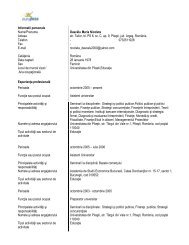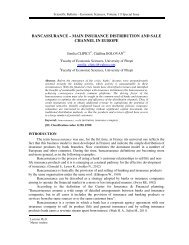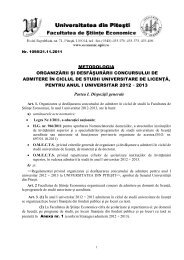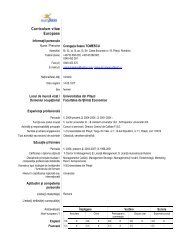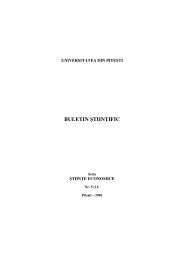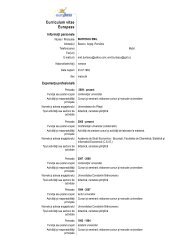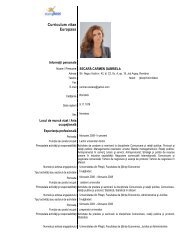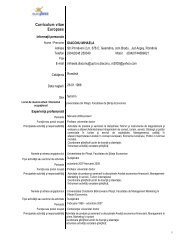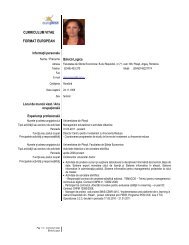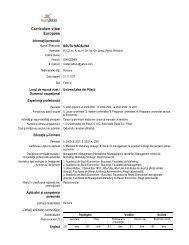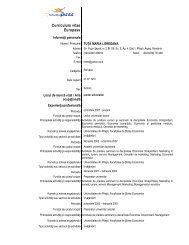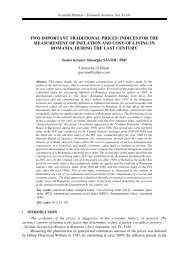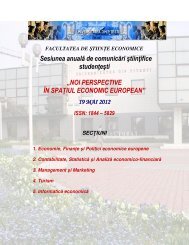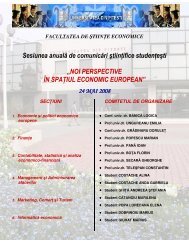buletin Åtiin ific - Facultatea de Stiinte Economice - Universitatea din ...
buletin Åtiin ific - Facultatea de Stiinte Economice - Universitatea din ...
buletin Åtiin ific - Facultatea de Stiinte Economice - Universitatea din ...
- No tags were found...
You also want an ePaper? Increase the reach of your titles
YUMPU automatically turns print PDFs into web optimized ePapers that Google loves.
EU and Western Balkan: ambivalent relationship?of political and economic conditions as a prerequisite for membership in the EU. Theseconditions have been evolving over time in the sense requirements were re-shaped, re-<strong>de</strong>finedand became even severe and tougher. So, in spite of the fact these countries adopted neo-liberalreform mo<strong>de</strong>l, perspective of membership was conditioned by new, additional (“self-evi<strong>de</strong>nt”-Bohle, 2006, p. 70) reform requirements. 9In return, they were supported by receiving some financial aid (Barnes and Ran<strong>de</strong>rson, 2006, p.353; Hooghe, 2003, p. 10), but rather mo<strong>de</strong>st comparing to existing members, which ma<strong>de</strong> thealready complicated transition even har<strong>de</strong>r. From the standpoint of Eastern Europe, EUrepresents the incarnation of economic prosperity and integration. That is why they wereparticularly receptive to the i<strong>de</strong>ology of economic liberalism: it was consi<strong>de</strong>red to be at the sametime the aim and the means of achieving “return to Europe” (Bohle, 2006, p. 74) - radicalalternative to their previous experience, as well as mobilizing factor necessary for transformationprocesses. Being in spec<strong>ific</strong> situation (and overbur<strong>de</strong>n with economic and other type ofproblematic inheritance), they have no chance to resist to the “passive revolution” created andorganized by transnational capital.Although countries were officially invited to join “the elite club” (Lister, 2002, p. 12; Barysch,2006, p.3) and more or less were given economic help to do so, imposing of political an<strong>de</strong>conomic conditionality and “aggressive” export of rules <strong>de</strong>man<strong>de</strong>d to satisfy (particularly forthose would-be-members), ma<strong>de</strong> latest enlargement of EU quite similar to “an imperialprototype” (Zielonka, 2006, p. 5). That is why structural asymmetry (Bohle, 2006, p. 1;Zielonka, 2006, p. 6), i.e. the existence of dominant actors, as well as peripheral ones (withdifferent status), is one of the main features of EU. 10This asymmetry is additionally “fed up” owing to enormous differences between “old” and“new” EU members. Judging by economic performances, the sign<strong>ific</strong>ant gap between existingmembers and applicants was noticed, i.e. countries inclu<strong>de</strong>d in enlargement to the east, are less<strong>de</strong>veloped – income levels of members belonging to 2004 enlargement “were on average 46.5per cent of the rest of the EU” (Barnes and Ran<strong>de</strong>rson, 2006, p. 351). Also, the information andtechnology gap (so-called digital divi<strong>de</strong>) in the EU is wi<strong>de</strong>ning substantially with any newenlargement (Hubregtse, 2005, p. 168). This obvious fact serves as an argument that the mere,starting influence of the EU is not sufficient condition (although it is necessary) for preventing“exclu<strong>din</strong>g” character of globalization. 11Realizing that these gaps could not be bridged easily (increased convergence was unlikely toachieve), a “core group” in EU (Zielonka, 2006, p. 3) offered to new-comers enough time forsome kind of phased compliance with EU legislation, in or<strong>de</strong>r to make accession processeasier. 12 This sort of exemption, however, can serve as the argument for those claiming that EUhas become a regional club with two sets of members: first-class and second-class ones (Barnesand Ran<strong>de</strong>rson, 2006, p. 356, 360; Hooghe, 2003, p. 39). 13 So, integration probably led to less9 “One might argue that EU would not really qualify to join itself if it had to apply for membership based on its owntreaties and their provisions” (Kuhnhardt, 2002, p.35).10 “The fact is that, within empires the peripheral states operate un<strong>de</strong>r <strong>de</strong> facto (if not <strong>de</strong> jure) constrainedsovereignty” – Zielonka, 2006, p. 6.11 Divergence of economics was justified by EU intention to create hospitable environment for coexistence ofdifferent systems (it is consi<strong>de</strong>red to be gentleman’s club where economic compromises are ma<strong>de</strong>) in or<strong>de</strong>r to shieldmember states from globalization (Heisenberg, 2004).12 This is quite similar to so-called “differentiated integration” (Ochmann, 1996, p. 2).13 Existence of superior and inferior members completely <strong>de</strong>nies constructivist i<strong>de</strong>a insisting on the accommodationof interests of new members. Frankly speaking, they emphasized the importance of higher costs than benefits, butneglected true (negative) consequences of enlargement for newcomers. At the same time, unequal terms ofenlargement were just partially confirmed by rationalist approach. They insisted on the i<strong>de</strong>a that long-termgeopolitical and economic interests of old members, as well as benefits for new ones (which outweighed costs ofenlargement) can be very useful in explaining both divergence of rights in Europe and new members willingness to12



